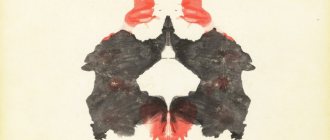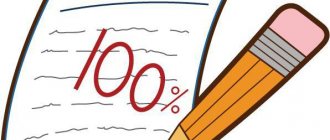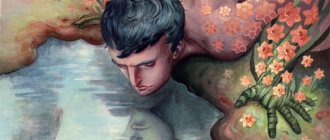Sometimes it can be difficult for a person to communicate with others...
“We got it!” - you think, ignoring the thought that it might not be about them at all. How well do you know yourself? Can you provide yourself with help and support when you need it?
If you find it difficult to answer, take the “What is my character” test. He will tell you who you really are! The test will allow you to see yourself from the outside!
Test “Who were you in a past life” by date of birth
Why you need to know your personality type
Each person has a unique set of traits. You will not meet two absolutely identical people. However, there are some regularities in the formation of individual characteristics.
People who have similar innate characteristics (type of nervous system, characteristics of mental processes, natural inclinations) and develop in similar socio-cultural conditions are very similar to each other.
In this regard, people several thousand years ago became concerned with creating a universal classification of people.
Short story
The background to the emergence of typology goes back to the works of Carl Jung, who, in his book “Psychological Types” published in 1921, suggested that there are four main psychological functions that help a person perceive the world. These are thinking, feeling, intuition and sensations. This work was much more fundamental than the ideas of the American Katherine Briggs, who was simply interested in the differences in the characters of different people. But, having become acquainted with Jung’s typology, she, supported by her daughter Isabel Briggs-Myers, began to study this issue in detail and even published a couple of scientific articles. She also identified four types, and was based, by her own admission, on the works of Jung. But later the theory was significantly expanded by her daughter, giving it a modern outline.
This happened during the Second World War. It was then that the Myers-Briggs Type Indicator (MBTI is actually a typology; the term “socionics” is also often used). This was not a “naked” theory - the researchers relied on original tests that they themselves compiled. The purpose of the research was the most noble: on the basis of testing, to determine individual personal preferences in work and to select for women who were supposed to replace men who had gone into the army in production, occupations where they could properly demonstrate their talents. Later, in the 50-60s, prominent scientists spoke positively about the typology, and new experiments were carried out to refine the methodology. But besides its followers, the MBTI also has a number of critics who point out that the Myers-Briggs typology almost duplicates the research of C. Jung in the theoretical part and does not always demonstrate its validity in practice.
How to find out your personality type
There are several ways you can determine your personality type. Not all of them are equally effective. Let's take a quick look at each of them.
- Special diagnostic techniques
This is the most reliable and reliable method. Psychological tests are developed by professionals and tested for accuracy and validity. Therefore, their results can be trusted 80%. “Why not 100?” - you ask. Much depends on how honestly and responsibly you answer questions and complete tasks.
Below you will find 10 methods for determining your personality type, with which you can type yourself. They are based on different criteria, so the more tests you pass, the more detailed your psychological portrait will be.
- Specialist consultation
An experienced psychologist types people with high reliability, based on his extensive professional experience. But it necessarily relies on diagnostic techniques too. Such typing can be more accurate, since the specialist knows how to bypass the client’s psychological defenses.
- Introspection
This is the simplest, but at the same time the most unreliable method. It is difficult for a person to objectively assess his characteristics, because psychological defenses seriously distort perception. Therefore, this method must be supplemented with others.
To try to type yourself, you must first carefully study the available psychological classifications, read the descriptions of the types, try on their characteristics for yourself, and try to find similarities and differences.
What does character consist of?
Character is a set of several elements
For many, character is some kind of abstract concept. Let's figure out what it consists of!
The test “What kind of fruit are you” will help you understand yourself better
| Component | Meaning |
| Interests | Interests have the most direct influence on our character and vice versa. As a rule, if you are calm, you are unlikely to enjoy racing bikes across the field |
| Circle of friends | Have you heard the saying, “Whoever you mess with, you’ll get rich from”? This is true. So try to surround yourself with good positive people. |
| Mentality | By “mentality” we mean area of residence and spiritual values. There's no escape from this |
| Upbringing | It is our parents who invest in us what later becomes an integral part of our character. The fruits of parental education, fortunately or unfortunately, are difficult to somehow change |
Pay attention! To change your character, you need to change some of its components. Just keep in mind that not all of them are subject to adjustment.
In this video you have to choose a person and find out your character!
Determining personality type using psychological tests
Psychological tests are widely used by teachers, HR specialists, sports coaches, doctors, criminologists and, in fact, psychologists themselves. With their help, experts create a detailed portrait of a person’s personality, on the basis of which they can correctly predict his behavior and build the most effective model of interaction with him.
It would also be nice for the person himself to get to know himself better. This will greatly simplify your life and make it more conscious. Knowing your characteristics, you can pick up the keys to the hidden reserves of the psyche.
Each test is accompanied by various recommendations: what profession to choose, how to smooth out your shortcomings and emphasize your strengths, what communication style to choose, etc. You just need to answer the questions carefully and honestly.
With these tests you can test not only yourself, but also other people. Testing of a child must be carried out under adult supervision.
More than 100 cool lessons, tests and exercises for brain development
Start developing
Professional techniques
Let's start with techniques developed by professional psychologists. These tests will show the most correct and accurate results.
- Eysenck test for determining temperament
It is best to start self-knowledge with this technique. Classifying people by temperament type is the basis on which all other typologies are based.
The test will help determine who you are: phlegmatic, choleric, sanguine or melancholic. The types are identified based on the characteristics of the human nervous system. They are innate and unchanged throughout life.
- Extroversion/introversion test
Swiss psychologist Carl Gustav Jung was the first to divide people into extroverts and introverts. This classification is based on the direction of a person’s energy: for extroverts it is directed to the outside world, and for introverts it is directed inward. Therefore, extroverts are sociable, cheerful, and energetic, while introverts are calm and reserved.
A little later, this classification was supplemented by another type - ambiverts. Representatives of this type combine the traits of both introverts and extroverts. According to the latest data, the world's population is distributed as follows: extroverts - 40%, ambiverts - 40%, introverts - 20%.
- Test to determine character type according to Kretschmer
The German scientist Ernst Kretschmer connected a person’s character traits with his physique. He noticed that people with similar morphological structures have similar psychological traits. Based on observations and experiments, he divided people into three types: picnics, asthenics and athletics. The test will help you determine which one you belong to.
- Leonhard-Smishek questionnaire on character accentuation
Accentuation is a character trait in which individual traits are overly pronounced. For example, anxiety can be either a normal character trait or an accentuated one. In the second case, a person experiences anxiety, even if there is no objective reason for this.
The German psychologist Karl Leonhard studied accentuations. He identified 10 personality types in accordance with a person’s prevailing accentuation. And Hans Schmischek developed a questionnaire based on this classification.
- John Holland Professional Personality Test
American psychologist John Holland has developed a technique that allows you to determine a person’s professional orientation.
The personal qualities required for each specific type of activity are combined into 6 large groups. Based on their predominance in humans, 6 personality types have been identified: realistic, investigative, social, conventional, enterprising, artistic.
Determine which one you belong to to understand which type of activity you can achieve the best results in.
SMIL test
This questionnaire will be useful to create your comprehensive psychological portrait. You will be able to find out your personality type, dominant character traits, communication style, risk appetite, level of self-esteem... And that's not all!
True, to get the coveted result, you will have to work hard: the full version of the test consists of 567 statements. You will have to choose whether you agree with them or not. But there is also a shortened version for express diagnostics consisting of 65 questions.
Take the full version of the test → Take the short version of the test →
How to change your character for the better?
Work on character and personality begins with the fact that a person needs to make a list of his strengths and weaknesses. Then he should consider what he can do to suppress or completely eliminate the weak qualities. Next, you need to pay attention to your strengths, which you need to work on.
Ways to improve your character for the better:
- Learn to visualize and think through your ideal character model down to the smallest detail.
- Work on creating healthy self-esteem and an adequate vision of yourself.
- Learn to say no and prioritize in your life.
- Do not refuse advice and help from other people. Ask your loved ones what specific qualities you need to develop and spend all your energy on realizing these character traits.
- Throw away prejudices, fill your inner world, take an interest in what is happening in the world.
- Find an activity or hobby that will help you achieve even small victories every day. Achieved goals will become reasons for pride and increase self-confidence.
- Find yourself a role model.
- Set yourself a goal and decide on your aspirations. Global goals and clearly defined prospects are the key to a successful life.
It is not enough to understand how to improve your character; you also need to have a clear understanding of how your life will change with these changes. This is what should become the motivating link for self-improvement and work on oneself.
Find your unique letter combination
ESTJ - leader
Hard work and determination are your best qualities. You adore order, know how and love to plan, and take on the most difficult tasks without fear, because you are confident of success. You have a rational view of things; you trust facts much more than feelings. You are cheerful, good-natured and love company. Thanks to your organizational talents, you can easily incite others into any adventure.
ENTJ - commander
You are always on the crest of the wave: you know everything about the latest trends and tendencies. You have a lot of courage, you like to take risks and are always open to new things. You are dynamic, productive and love to overcome challenges. Your whole life is a struggle in the name of achieving your cherished goal. You have excellent leadership qualities: charisma, authority and the ability to think strategically attract people to you.
ENFJ - mentor
You are very insightful: you trust your intuition, and it never lets you down. You are observant, have a genuine interest in people and their emotions, and are able to detect the slightest changes in mood. People around you often turn to you for advice and support, and you are always happy to help them, and sometimes inspire them.
ESFJ is an enthusiast
You get along well with people and are always ready to help, sometimes even to the detriment of your own interests. You are responsive and open. Love and appreciate praise; you need the approval of others like air. If a conflict arises somewhere, you feel out of place and try to restore peace and harmony at any cost. You are like a ray of light in a dark kingdom - you are able to charge people with positivity and lead them.
ENTP - inventor
People like you are often called thought leaders. You are curious, mobile, love to be on the move and easily adapt to change. You are a true generator of ideas, constantly inventing and questioning things. You hate routine and try your best to avoid it. You are captivated by the new and unknown, so you often change hobbies. You think that in life you need to try, if not everything, then a lot.
ESTP - fidgety
The phrase perfectly describes you: “I see the goal - I see no obstacles.” You strive for victory at any cost, sweeping away all obstacles in your path. You are determined and daring, live in the moment and love to be the center of attention. The thirst for life is boiling inside you, you strive to learn everything in practice and not waste a single valuable minute.
ENFP is a champion
You are a creative person with an indefatigable imagination and excellent imagination. You are open to the world, freedom-loving, stress-resistant and not afraid of change. It is important for you to constantly take the initiative, offer original solutions, actively interact with people and empathize with them. Routine tasks are pure torture and punishment for you.
ESFP - politician
You live for today and get great pleasure from momentary pleasures. Planning and strategizing tire you out. When doing something, you often rely on luck, and if you fail, you quit the job without finishing it. You are spontaneous and unpredictable, you hate delays and strive to get everything at once. You love to impress others and make useful contacts.
ISTJ - administrator
“Measure twice, cut once” - this is about you. You love rigor and order, carefully think through and analyze your actions. You are results-oriented, so you only take on tasks that you know you can complete. You are careful and patient, and do not like empty chatter. You value honesty and hard work, and attempts to shirk responsibility cause you the same resentment as poorly done work.
INTJ - strategist
You are independent, erudite and know how to set priorities correctly. You do not like noisy companies, and you draw inspiration and breakthrough ideas from within yourself. You are a perfectionist to the core, and your cherished dream is to make the world around you more perfect. You hate retrograde rules and stupid restrictions and try to fight them with the help of your innovative ideas, in which you often succeed.
INFJ is a humanitarian
Helping others is an integral part of life for you. You believe that love and compassion can save the world. If one of your loved ones needs help, then he will definitely turn to you, and in return he will always receive clear guidance for action. You are vulnerable, value loyalty and do not forgive betrayal.
ISFJ is a protector
You can smell falsehood a mile away, so you keep strangers at a distance and stand behind your loved ones. You do everything to make the people you care about happy, and every day you try to pleasantly surprise them. You are diligent and often make incredible efforts to achieve your goals. True, you can be leisurely and like to procrastinate. Despite this, you can be relied upon because you never give up on what you started.
INTP - Architect
You have a philosophical mind. You constantly put forward hypotheses, argue with yourself, notice important details and strive to get to the bottom of things. From the outside it looks like you are distracted and have your head in the clouds. This is partly true: everyday issues do not bother you at all. You are focused on important thoughts and do not feel much interest in others. You value coziness and comfort, but have an extremely negative attitude towards change.
ISTP is a virtuoso
You experience the world through sensations, are able to deeply empathize with people and value sincerity. You are quite open, but in case of lies or hypocrisy, you withdraw into yourself. You think through every step carefully before you do anything. You are punctual, objective and moderately curious.
INFP - lyricist
The meaning of life for you is harmony with yourself and the world around you. You are an impressionable person and react sharply to any injustice. Self-expression is important to you: you not only do great work on your inner world, but also do not forget about your appearance. You can be dreamy and self-absorbed, but you always find an opportunity to pay attention to your loved ones.
Questions
1. You had a day full of failures and disappointments. How will you spend the evening?
- Need a break! I’ll call my friends and invite them somewhere, it’s more fun to experience sorrows together. (E)
- I’ll be alone with myself: I’ll turn on my favorite TV series, cook some tasty treats, or come up with some other pleasant activity. (I)
2. You came to a psychologist. He asks the question: “Which of the two statements describes you more accurately?” Choose.
- I prefer to live in the present: what is important to me is what happens here and now. I am distinguished by practicality and attention to detail. (S)
- I often have my head in the clouds: I like to dream and make great plans for the future. Sometimes I get so lost in myself that I don’t notice anything around me. (N)
3. You have been offered to move to a metropolis. Now you are in thought. There are more opportunities in a large city, but where you live now, you have your loved ones and a cozy home. How will you make a difficult decision?
- I’ll scour the Internet, consult with knowledgeable people, and calculate an approximate budget for moving. I will carefully weigh the pros and cons, then make a decision. (T)
- I will do as my heart tells me. My intuition has never let me down. (F)
4. In a month you have a long-awaited vacation, hurray! How are you preparing for it?
- Tickets have already been purchased, insurance has been arranged, and a plan for conquering the sights has been drawn up. I like to prepare for everything in advance. (J)
- Spontaneity is my middle name. A couple of hours before the flight, I’ll throw everything I need into my suitcase and ask the locals about the sights. (P)










